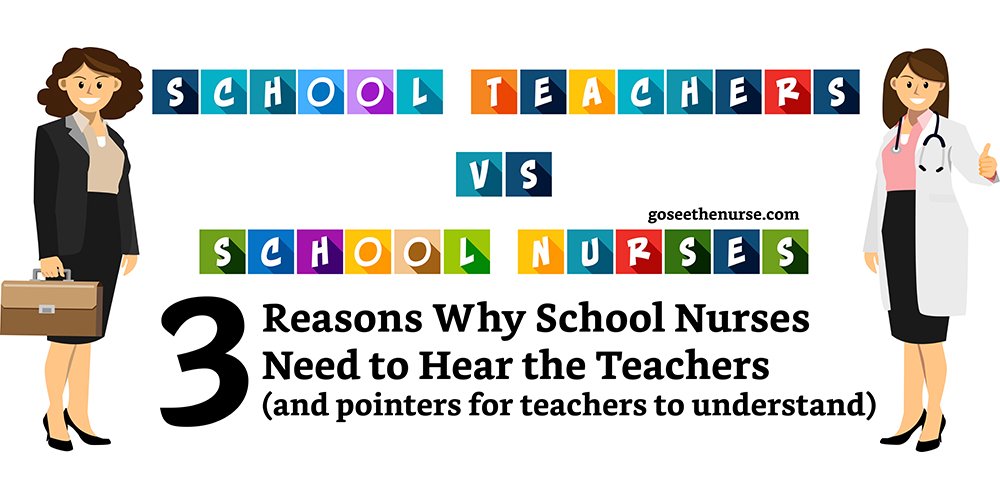
Two teachers came to visit me today. They were polite as they approached me with a few questions. At first I didn’t know what to think; I didn’t feel like they were teaming up on me, the school nurse. But I did feel they were attempting to “tread on thin ice.” Funny thing is: My ice is pretty thick.
“We wanted to see if anything had changed as far as policies go,” one asked. “Sometimes the students come down to see the nurse and then come back to class, lay their head down, and try to rest. When I ask what’s wrong, the child says, ‘The nurse said I wasn’t sick’.”
They were not being coy or rude; they were genuinely looking for information and understanding. “We’re not trying to tell you how to do your job, but…”
I quickly realized that the intention of the two teachers was to ask, though in too many words, “When we send the kids down sick, why do you send them right back to class still sick?”
Teachers teach, and nurses nurse, right? Na… No way, Jose’! It hasn’t been as often as I’d like, but I have gotten in front of the classroom and taught multiple times. Teachers have put Band-Aids on children before. The line between the roles of school nurses and teachers should be gray and somewhat fuzzy and more like a “shared responsibility” rather than a fine, red line that dichotomizes (that’s a fun word) the two roles.
“We sent a child down earlier because she said she was going to throw up, and you sent her back to class. She ended up throwing up, and I called her mother to pick her up.”
Sometimes We Just Call It Wrong
Nurses are not perfect. One of the challenges of being a school nurse is to be able to spot the fakers. Yes, believe it or not, some children fake it. But not all. Some will show up with no fever, no temperature, no other symptoms. They will stay in the office for 10, 15, or even 30 minutes, talking with the other sick and injured children. When they seem like they are OK and ready to return to class, you send them back. Two seconds later, they throw up…in the hall…on the carpet.
Other children will show up appearing sad and suffering from symptoms that no child should ever have to endure. “I’m so sick, Nurse Kevin. My head hurts and even my littlest finger.” However, once that call is made to momma, and the child knows her mother is en route, “Nurse Kevin, can I go get my bag from my cubby? Nurse Kevin, can I have a mint? Nurse Kevin, can I go outside and play on the spinner?” I plead with these children to sit down and at least act like they are sick!
What do you do when two girls walk in, both having fallen off the monkey bars and both complaining of right arm pain? One sits up and starts telling you all about what she was for Halloween, while the other lies on her right arm and appears to be resting, but engages nonetheless, “I was a princess bride.”
“Okay girls, back to class.” The first one goes back. But the second one sits up and complains of pain just as soon as the words “back to class” come out. First she was talking “princess,” and now she’s crying about her arm. She lies back down and on the injured right arm. The tell-tale sign came when she experienced relief when lying on the arm and screamed bloody murder when she was sitting up. Splint – call momma – hospital. Sure ‘nuf: broken!
We school nurses make a “bad” call once in a while. It’s not us, nor is it a lack of skills and experience. We could blame it on the lack of district funding. I mean, really! Couldn’t the taxpayers of our fair city pay just a little more in taxes to fund our school with an x-ray, CT, and an add-on facility for a barium swallows. So many tummy aches could be remedied by a good dose of Ex-Lax and a 1000 cc soap-suds enema…but…I digress. The point is: we school nurses “call it as we see it” during the limited time we have the children in our offices. The child may have been complaining of being sick while she was in the classroom and trying to focus on reading a story about a cat. She may not like cats, and the story was boring her, causing her to focus more on her empty stomach that she has determined is a stomach ache, and therefore she needs to go see Nurse Kevin. But, the trip down to the health office is pretty comforting. Maybe she’s thinking, “It’s not even time for first recess; I may be home before lunch time.” Then she comes to the health office, and there’s her friend from Ms. So-And-So’s class. Whaddaya know! She’s sick, too. Then a conversation about who’s the sickest takes place. Fifteen minutes later, the two are returning to class and both vomit in their respective rooms and on the carpets. You just moved down not one, but TWO steps on the custodian’s like-ladder. Problem is: You were already down on step number one!
It’s a guessing game sometimes. One child enters the office with a stomachache, and a few minutes later, another shows up with an abrasion and reports,“It hurts real bad when I do this…” Another shows up with pain in their knee that “has been hurting for five whole days.” Then a child with a bump to the head arrives, and there’s a bit of bleeding from the forehead. You may have been working on immunizations when the end of recess time rolls around, and all the traumas that occurred on the playground are being reported…during line up. You get a little rushed; things aren’t bad until the child with the bump to the head begins to show symptoms that may indicate that there may be a little bit more to that bump than the forehead abrasion is letting on. You clear the room, and the other three head back to their classes.
With one child to focus on, you check for concussion, call momma with the report and findings, and get the child comfortable for a longer-than-usual health office visit. Then returns the kiddo with the stomach ache. There’s the proverbial garbage can in tow and remnants of vomit on the side of the can (down another step on that custodian’s like-ladder); the hurt-hand child returns with a melting, dripping ice pack and needs another one (to play with); and the knee-pain child returns with a nursing pass and teacher’s notation, “Tylenol please.” (How do you put a second line under “please” in HTML?). A bad call? Maybe not…
That double-line under “please” is not for you…specifically. It means, “I am trying to teach these children, and this one has asked to go see the nurse 357 times, and if we make it to 358 my hair will all fall out, and I’ll scratch the chalk board with my fingernails (well…there’s no chalk boards anymore, but you get the idea).”
Three Reasons Why School Nurses Need to Hear the Teachers
1) The Teacher Knows the Child
These teachers know their children. About now, mid-November, the teachers have spent hours and hours with their children and have a pretty good idea when one of their own is just not himself or herself. We nurses, on the other hand, may have seen the child that has just arrived at our office only one or two times since August or maybe even just one or two times since the August before and for only 10 or 15 minutes. We assess for symptoms and find nothing that would “jump out at us.” Giving the children Tylenol or Ibuprofen just to get them out of the health office is not a good idea; after all, they are not feeling ill because of a Tylenol or Ibuprofen deficiency. It could be from the four donuts they had this morning during Donuts with Dads or the three muffins during Muffins with Mom, but there’s nothing that indicates an illness that wound necessitate a call home. It could be…and I am going out on a limb here…that the child is becoming sick, and the teacher has noticed a certain, slight change in the child’s demeanor. She’s just not herself. But, we nurses don’t know the child well enough to know that “she’s just not herself.”
2) Parents Communicate More with the Teachers Than the School Nurse
Parents are busy. They have a to-do list (mostly in their heads), and they plan to get stuff done when the day gets started. First: Call the teacher and make sure she has little Johnny check the lost-and-found for his jacket. “And, by the way, his sister is staying home today because she’s been vomiting. I don’t know what it is; she’s not running a temperature.”
Nurse passes are small; teachers are busy. The pass may say, “His sister is sick home today.” This child has no temperature and no vomiting…yet. (But we need to be cautious here; there are no more steps on the custodian’s ladder to descend.) Even after 20-30 minutes’ rest, there is no vomiting.
What does that short note on the pass mean: “His sister is sick home today.” It means: Take an extra close look at this one. I have inside information that may help you decide what’s the best course of care for this child. If his sister is puking at home, there’s a possibility that this child is percolating as well. Call the mother for more information. Yes. All of that comes from the teacher’s six-word notation, “His sister is sick home today.”
3) Teachers Are Mommas and Daddies
Many teachers are parents of children of their own. The ones that are not parents usually have years of education and teaching experience with children. To put it simply: Teachers know kids. No, I am not saying that all teachers know kids and how to assess a child for medical issues. But teachers know kids when they are happy, and they know kids when they are sad.
It’s my belief that nursing is 20% book-smarts, 30% experience, and 50% common sense. Experience is gained not only from your own trials, but from listening and learning from the trials of others. Teachers can identify the stomach ache, but nurses have the ability to identify the child with the “hot” appendix. When you see a child in your office that a teacher has sent down because of the stomach ache, she or he knows something may be wrong, but what is that “something?” The worst thing ever in a million years you can say to a teacher when they send the child back a second time because the child is having a stomach ache is, “I’m the nurse.” That three-word sentence will come back and bite you where the sun don’t shine…and when it does, it will bite HARD!
These teachers have raised children (and some have lost children), and sometimes the teacher hat melds with the momma hat, and that instinct kicks in. They know something is wrong and know that more attention is needed. The nurse…you…may not be picking up on the subtleties; it’s not because you are a bad nurse. But, for whatever reason, the teacher sees something that you don’t, and you’d better look a bit longer and harder. Miss the developing appendicitis after the teacher “just knew something was wrong,” and you’re toast. Catch the appendicitis, and you’ve saved the day. The teacher may still say, “I just knew something was wrong.” Let her! She deserves the glory of having saved the day! Hey, you’re the nurse; you’ll get plenty of opportunities.
Your information is kept private! Here’s my Privacy Statement.





One thought on “School Teachers vs. School Nurses – 3 Reasons to Listen”
Comments are closed.